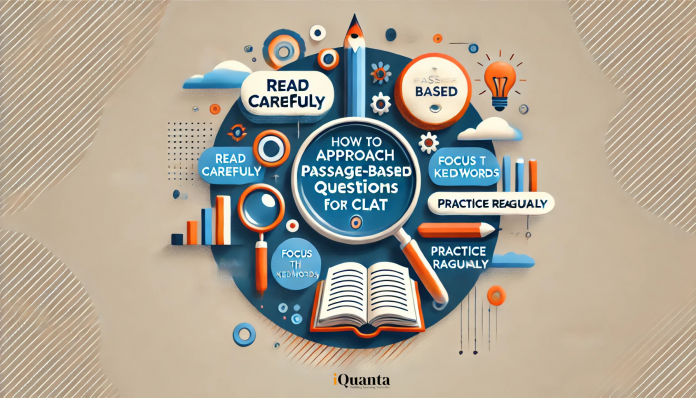In recent years, the Common Law Admission Test (CLAT) has undergone a significant change, with all sections now placing more of an emphasis on passage-based questions. This change necessitates not only information but also reading, understanding, and analysis abilities. It is imperative that candidates aiming for CLAT 2026 become proficient in passage-based questions. This blog will give you a thorough approach to answering these questions successfully, dissecting methods, potential problems, and recommended practices to guarantee excellent results.

Knowing How Passage-Based Questions Are Structured in CLAT
The purpose of CLAT’s passage-based questions is to assess a variety of abilities:
- Comprehension: Understanding the passage’s main idea and subtleties is known as comprehension.
- Critical Thinking: Analysing arguments, recognising presumptions, and making deductions are all components of critical thinking.
- Application: Connecting the information in the passage to logical thinking frameworks or legal principles.
These questions appear in the following sections:
| Section | Nature of Passages | Key Skills Tested |
| English | Literary and contemporary texts, editorials | Reading speed, vocabulary, analysis |
| Logical Reasoning | Arguments and opinion pieces | Critical thinking, inference |
| Legal Reasoning | Legal scenarios, court judgments | Application of legal principles |
| Current Affairs (GK) | News-based, analytical articles | Contextual knowledge, inference |
| Quantitative Techniques | Data interpretation and real-life mathematical problems | Analytical skills, numerical ability |
Each passage requires a nuanced approach, as the question formats vary from direct comprehension to inferential reasoning and application.
CLAT Game-Changer Strategy: A Step-by-Step Guide
- Skimming vs. Detailed Reading
CLAT passages can be drawn out and time-consuming. Here’s how to make reading more efficient:
- Start by skimming the section to get a sense of its main ideas, tone, and structure. Search for keywords and theme sentences.
- Prior to reading in-depth, read the questions to become familiar with the requirements. This offers a path for focused reading.
- Pay Attention to Important Areas: Sections that correspond with the questions should be carefully read. Don’t spend too much time on small details unless absolutely necessary.
- Identifying Keywords and Themes
The key to reading well is recognising important components:
- Keywords: Expressions such as “however,” “but,” and “although” indicate changes in argument or tone.
- Themes: Understand the main point or takeaway. For example, concentrate on the idea being discussed in a legal section.
- Data and Figures: Emphasise any examples or statistical data that are frequently cited in the questions.
- Annotation and Note-Taking
An effective strategy for maintaining interest in the passage is annotation:
- Highlight important sentences by underlining definitions, arguments, and conclusions.
- Notes on the margin: Write succinct summaries of paragraphs.
- Symbols: Use “?” to indicate scepticism, “*” to indicate important points, or “!” to indicate startling information.
- Time Management
| Task | Ideal Time Allocation |
| Reading the passage | 2-3 minutes |
| Answering questions | 1-1.5 minutes per Q |
| Review (if needed) | 30 Seconds per Q |
Allocate more time to challenging sections like Logical or Legal Reasoning, but ensure a balanced approach across the paper.
- Critical Thinking and Inference
It is frequently necessary to go beyond what is mentioned directly in passages. Make use of these methods:
- Elimination: Remove choices that are irrelevant or factually inaccurate.
- Inference: Combine facts from the passage to infer implied meanings.
- Comparison: To select the most correct response, note any minor variations between the options.
- Handling Tricky Questions
| Type of Question | Strategy |
| Direct Comprehension | Locate and re-read the relevant section. |
| Inference | Consider the overall tone and theme. |
| Assumption | Identify underlying premises supporting arguments. |
| Application | Relate the principle or fact to the context. |
- Building Stamina and Speed
Maintaining attention is essential for success when answering passage-based questions:
- Use timed mocks to improve your speed by simulating exam conditions.
- Develop Better Reading Habits: Every day, read newspapers, court rulings, and scholarly articles.
- Improve your vocabulary to cut down on the amount of time you spend decoding difficult words.
Typical Mistakes to Avoid
- Overanalysing: Refrain from second-guessing your response until there is convincing evidence to the contrary.
- Ignoring Context: Always take into account the larger context rather than focussing on individual sentences.
- Skipping Questions: Try every question, even if a paragraph appears challenging. Well-informed assumptions can be useful.
- Time Mismanagement: Avoid devoting too much time to a particular paragraph or query.
Sample Practice Passage and Questions
Passage Excerpt: “In recent years, climate change has spurred debates on corporate responsibility. While governments worldwide emphasize policy changes, corporations play a pivotal role in driving sustainability. Critics argue that voluntary measures lack accountability, advocating for stricter regulations to ensure compliance.”
Sample Questions:
- What is the central theme of the passage?
- (A) Climate change debates
- (B) Corporate responsibility in sustainability
- (C) Role of governments in policy-making
- (D) Accountability in environmental measures
- Which of the following best describes the tone of the passage?
- (A) Neutral
- (B) Critical
- (C) Persuasive
- (D) Analytical
Practice Resources
| Resource Type | Examples |
| Newspapers | The Hindu, Indian Express (editorials, opinion columns) |
| Online Platforms | iQuanta, Bar and Bench, Live Law |
| Mock Tests | CLAT Consortium mocks, iQuanta comprehensive tests |
| Books | Word Power Made Easy, R.S. Aggarwal (Logical Reasoning) |
Conclusion: Gaining proficiency in passage-based questions is crucial for candidates taking the CLAT in 2026. You can confidently address these questions by creating an organised strategy that includes time management, critical thinking, annotating, and skimming. These techniques, when combined with intense preparation and an analytical approach, will set you up for success and turn passage-based questions from a problem into a chance to surpass your rivals.

